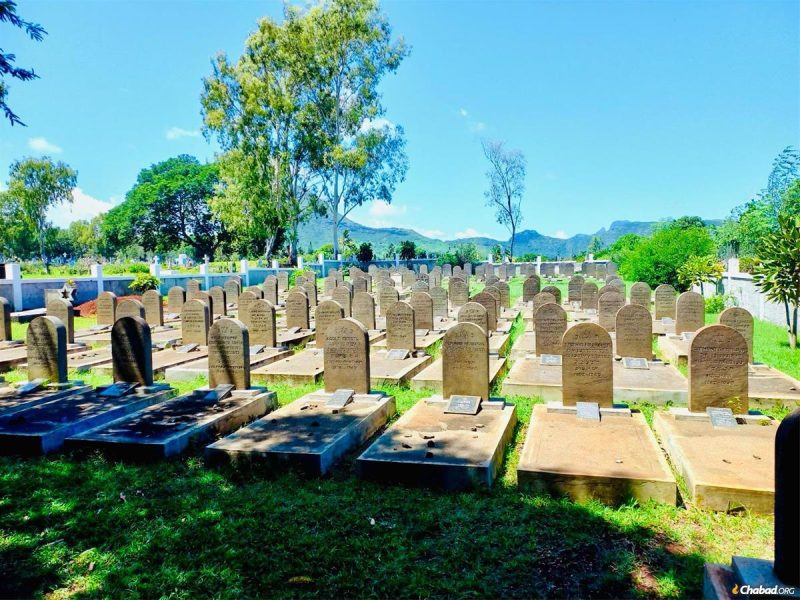
Buried as a Jew: Fulfilling French Author Paul-Loup Sulitzer’s Final Wish on Mauritius
by Mendel Super – chabad.org
When his health began to decline, Paul-Loup Sulitzer turned to his local Chabad rabbi. The famed French intellectual, financer and author had grown close to the rabbi following his retirement to Mauritius, a remote island in the Indian Ocean off the coast of South Africa. Sulitzer’s request was an age-old one: “Please bury me as a Jew,” he asked Rabbi Laima Barber, director of Chabad-Lubavitch of Mauritius. Barber assured his friend he would do so.
Sulitzer was born in Boulogne-Billancourt, just outside of Paris, in 1946, the son of a Romanian Jewish immigrant who fought with the French Resistance during World War II. At the age of 16 he dropped out of school, spent six months working on a kibbutz in Israel, and then returned to France to begin a career as a teenage entrepreneur. Selling gadgets and keychains in the 1960s, he quickly became one of France’s youngest millionaires. He parlayed that success to set up a successful financial consultancy, ultimately achieving acclaim as one of France’s premier popular authors, publishing some 35 books over two decades. In his waning years, as he battled health challenges, Sulitzer retired from the public spotlight and retreated to the island of Mauritius, where he formed a warm relationship with Barber.
“From the moment I met him, he struck me as extraordinarily smart—almost larger than life,” Barber—who together with his wife, Mushkie, has served the Jewish community of Mauritius since 2011—told Chabad.org. “Every time he came to shul, people gravitated toward him; they wanted to learn from him. We put on tefillin together frequently and had many deep conversations.”
On Feb. 6, 2025, Sulitzer passed away at the age of 78. Early the next morning, a Friday, Barber got in touch with the French embassy on the island to work out details of the author’s burial. After working through the various bureaucratic red tape, the rabbi figured he’d be able to lay Sulitzer to his eternal rest within a few days. “But then, on Saturday night, I got a call from France—from Paul-Loup’s friend and lawyer, Jean-Luc. He told me there was an emergency: a relative had arranged for him to be cremated on Monday at noon.”
“We cannot allow that to happen,” Barber responded.

The Importance of a Jewish Burial
The importance of a proper burial in Jewish law and tradition cannot be underestimated. “For dust you are, and to dust you will return,” G‑d told Adam, the first human being. Chabad.org’s extensive section on Death and Mourning quotes King Solomon, who said: “And the earth returns to the land as it was, and the spirit returns to G‑d, who gave it.” The article explains that “the next stage in the continuing saga of a human life is that the body should return to the earth, the source of all physical life, and be reunited with it, just as the soul returns to its Divine root.”
Taking part in the proper burial of a Jewish person is considered a mitzvah of the highest order. The Talmud (Nazir 7:1) teaches that even the High Priest, who was prohibited from attending his own family’s funerals, was required to take it upon himself to personally bury a met mitzvah, an abandoned Jewish body that had no one to attend to its proper burial.
Unable to contact the relative, Barber and the French lawyer decided to call Sulitzer’s youngest daughter, who they hoped could overturn the decision. “Once things are already set in motion, changing them becomes a whole ordeal,” the rabbi explains, “but I told Jean-Luc, ‘I’m not afraid of the challenge. I know what Paul-Loup wanted.’ ”
Barber reached the daughter, who agreed that her father wanted a Jewish burial. Then, the rabbi informed the funeral home that there was an objection. Legally, he explains, “They could not proceed with the cremation unless there was confirmation. We told them we would obtain an injunction from a French court.”
On Monday, the trio—the rabbi, the lawyer and Sulitzer’s daughter—presented their case before a French judge, Barber submitting a letter detailing the importance of burial in the Jewish tradition, his relationship with Sulitzer and the stated wishes of the deceased.
Twenty-four hours later, the verdict arrived: Sulitzer, the judge ruled, would have wanted a Jewish burial in Mauritius. On appeal, the ruling was upheld.
“For a French judge to recognize the significance of Jewish burial and rule that it was necessary was incredible,” Barber says.
On Sunday, February 16, ten days after his passing, Paul-Loup Sulitzer was buried in the Jewish cemetery in St. Martin, Mauritius.

The cemetery was founded in 1943 by a group of 1,500 Jews whom the British denied entry to British-mandate Palestine as they attempted to flee the Holocaust. British authorities sent them to languish in difficult conditions in Mauritius, where 128 of them succumbed to tropical diseases and food scarcity. “They built this cemetery to bury their dead, and it is maintained and in use by the community to this day,” says Barber, who has presided over three funerals there.
From those early struggles, a beautiful Jewish community has grown. While a census claimed there were only 43 Jewish people in the country in 2011—the same year the Barbers arrived—the rabbi states that there are actually hundreds. Additionally, millions of tourists visit the tropical island paradise every year, and Chabad of Mauritius caters to the needs of Jewish travelers and the local community, hosting regular prayer services and Torah classes, a kosher delivery service and supervision of kosher food options in local supermarkets—all the amenities a Jewish community needs to thrive.
As Barber prepared for Sulitzer’s funeral, he got to work gathering a minyan—the requisite ten Jewish men for Kaddish to be said at the service—and asked a regular visitor to the island, a French Jew named Chalom G., to join. On his way to the funeral, Chalom called the rabbi and asked whose funeral he would be attending: “Paul-Loup Sulitzer,” came the reply.
After the service, Chalom G. related to Barber what had happened next. He’d called his mother in France, and when he told her whose funeral he was heading to, she began to cry. “When we first arrived in Paris, Paul-Loup helped us settle in and introduced us to the local community rabbi,” she told her son. That decades-old connection had been crucial to their family’s Jewish growth. “Paul-Loup was even at your brit milah,” his mother added.
Years later, here was Chalom returning the kindness, helping ensure that Sulitzer, a Jew “formed … of dust from the earth” was returned, as a Jew, to the dust of the earth.
















